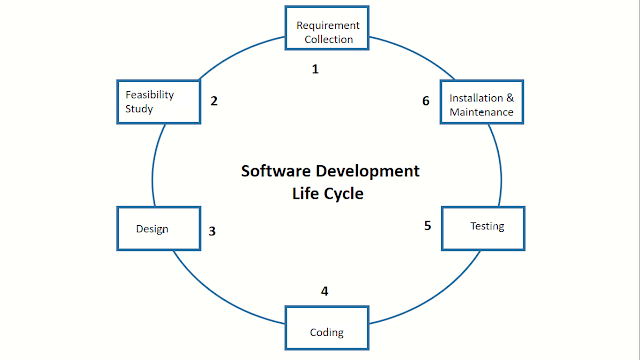Ok let’s understand software development life cycle with the help of a block diagram:

Above phases/steps are represented with the help of models some of which are:
2. Spiral Model
3. V & V model or Validation and Verification Model
4. Prototype Model
1. Requirement Collection: requirement collection is the process of gathering requirement by going to the customer or client place. On the basis of customer requirement, a document is prepared which is known as CRS (Customer Requirement Specification) or SRS (Software Requirement Specification). The task of gathering information from the customer is done by a person called B.A or Business Analyst.
To read more in-depth about SRS or CRS and Business Analyst Role phase please click here.
2. Feasibility Study/Analysis: feasibility study is a very important step under this step each and every thing is analyzed and seen whether we can or cannot develop the software/application. During this process a number of parameters are taken into consideration some of these are:
a. Tools and technology which are going to be used during software development.
b. Resources to be used weather men or machine.
c. Time duration in the development of software.
d. Profit and loss
To read more in-depth about Feasibility Study phase please click here.
3. Design: This phase serves as input for the next phase of the model.There are two kinds of design documents developed during designing phase these are:
High-Level Design (HLD) -
· A Brief description and name of each module
· An outline about the functionality of every module
· Interface relationship and dependencies between modules
· Database tables identified along with their key elements
· Complete architecture diagrams along with technology details
Low-Level Design(LLD) -
· Functional logic of the modules
· Database tables, which include type and size
· Complete detail of the interface
· Addresses all types of dependency issues
· Listing of error messages
· Complete input and outputs for every module
To read more in-depth about Design Phase please click here.
4. Coding: coding is simply the implementation of design. Under coding there are various things which takes are:
It is the longest phase in the software development life cycle. In coding phase task is assigned to the concerned developer (Java Script - Developer, HTML - Developer, CSS – Developer, Data Base Developer)
b. Platform/OS/Browser/Device is selected on the whole coding task is to be completed these could be:
Linux, Mac, Windows, Chrome or Firefox etc.
To read more in-depth about coding and platform selection please click here.
5. Testing: once the code writing is complete that means the software development process is complete but the software is still not delivered to the customer because it has to be tested thoroughly before final delivery to the customer to find weather there is any bug in our newbie.
So each and every function or task performed by this software is checked thoroughly for its 100% accuracy once the testing team finds no bug they give the software a green signal which means the software is now ready to be installed on client server or computer.
6. Installation and Maintenance: since the software has no bug now so it is the final stage when the software is finally installed on the client server or on client machine now by maintenance we mean that if there is any issue arise in future, the concerned software or application developing will be called for removing or fixing this bug.
This is how we learnt how a software development life cycle completes through its various phases of developments.